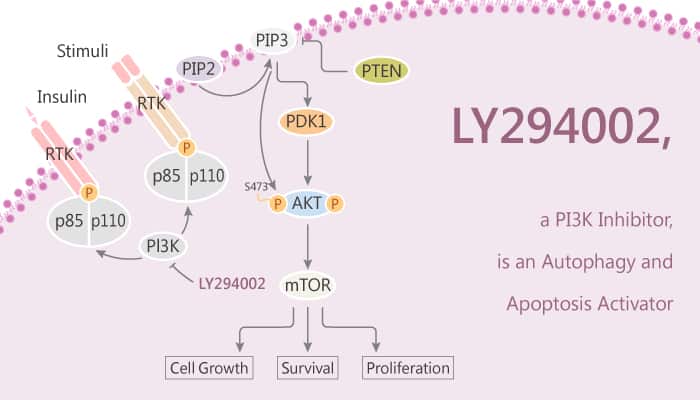The phosphatidylinositol-3 OH kinase (PI3K)/Akt signaling pathway contributes to cancer survival, apoptosis, and regulating a variety of cellular processes. In particular, Akt serine/threonine kinase plays a critical role in controlling the balance between cell survival and apoptosis. Dysregulation of this pathway is frequently observed in a variety of tumors, including brain tumors and breast, ovarian and nasopharyngeal carcinomas. LY294002 is a chemical inhibitor of PI3K. Inactivation of PI3K using LY294002 leads to the dephosphorylation of Akt at both T308 and S473, consequently inducing specific G1 arrest in cell growth and finally to cell apoptosis. In this study, LY294002 is a broad-spectrum inhibitor of PI3K with IC50s of 0.5, 0.57, and 0.97 μM for PI3Kα, PI3Kδ and PI3Kβ, respectively. It also inhibits CK2 (IC50=98 nM). LY294002 is a competitive DNA-PK inhibitor that binds reversibly to the kinase domain of DNA-PK (IC50=1.4 μM).

LY294002 remarkably decreases human nasopharyngeal carcinoma CNE-2Z cells in a dose-dependent fashion. It induces CNE-2Z cells apoptosis rate in dose-dependent. LY294002 significantly decreases p-Akt (S473) expression levels and up-regulates caspase-9 activity in CNE-2Z cells. Total Akt protein level is not difference with different concentrations. Moreover, LY294002 partially suppresses Lysophosphatidic acid (LPA)-induced (20 µM; for 4 hours) nuclear translocation of YAP, accompanied by a reduction in p-AKT levels. It significantly reduces the mean NPC tumor burden in a dose-dependent manner. LY294002 is less effective in decreasing tumor burden. Akt plays a critical role in regulating the sensitivity of CNE-2Z cells to the induction of apoptosis by LY294002. In addition, it is also an autophagy activator.
In summary, LY294002 is a broad-spectrum inhibitor of PI3K and also an autophagy and apoptosis activator.
Reference:
Jiang H, et al. J Exp Clin Cancer Res. 2010 Apr 22;29:34.